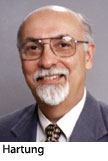With Dr. Bruce Hartung
Q: It is said that there is a clergy shortage in our LCMS. And, as a result of that shortage, many pastors have multiple ministries — perhaps as associates or assistants who have other roles that often do not involve the public ministry.
In many of these cases, couldn’t Lutheran deaconesses be deployed? They could provide support to a pastor’s ministry in areas that do not involve the public office, freeing up the pastor to perform tasks more central to the public aspects of his ministry.
A: Your question is a great one, and would be so even if it were not said th at there is a clergy shortage. I will answer it, but I first need to confess that I am wearing two hats — one as the writer of this column, and the other as faculty director of Deaconess Studies at Concordia Seminary, St. Louis. Please read the rest of this column with that in mind.
at there is a clergy shortage. I will answer it, but I first need to confess that I am wearing two hats — one as the writer of this column, and the other as faculty director of Deaconess Studies at Concordia Seminary, St. Louis. Please read the rest of this column with that in mind.
It does not take a shortage of any church vocation for a congregation to assess its ministry needs, which is one of the underlying core issues with this topic. It is important for a congregation and its leaders to take that parish’s collective pulse. They might ask the following questions:
- What is a needed function of ministry for the congregation to fulfill its mission in a robust and healthy way?
- How can that function be served?
- What type of person might fill that function?
In this context, our Synod has a number of folks trained with different areas of ministry expertise.
The LCMS roster includes the following commissioned church vocations: director of Christian education, director of Christian outreach, director of parish music, lay minister, parish assistant, teacher, family life minister, and deaconess. In addition, there are several vocations in parish ministry that are generally not commissioned in the same way as those above, particularly the parish nurse. Those are all church professions, along with the ordained pastoral minister.
When a congregation begins to survey its needs to expand the quality and/or amount of its work, many church professions might fit the bill, depending on the nature of the need.
For instance, if the congregation wants to focus on its family ministry, it might well look for a person trained in that area. If the need is for organizational and administrative support, a parish assistant might fill that need.
What, then, about the possibility of a congregation calling a deaconess? And what needs would a deaconess serve?
In the LCMS, a deaconess is a theologically trained woman with expertise in the private aspects of ministry — distinguished from public aspects of leading worship, preaching, and administering the sacraments, as I think our writer understands.
Visitations, calling on members, counseling, administration, and Bible study are some of the appropriate activities for deaconesses in the LCMS.
So, if a congregation wished to bolster its hospital visitations, evangelism or shut-in calling, or its small-group work, a deaconess could very well fit the need, since deaconesses are trained in these functions. By working in these areas, a called deaconess would take the pressure off a congregation expecting a pastor to do the same things. In a sense, then, this would ease the so-called clergy shortage.
I believe it is a very good thing for a congregation to cast a broad net, surveying its actual needs. Then the congregation can choose from among a number of specifically trained church workers to meets its specific needs. By the way, this would also be true for service organizations of the Synod who have specific ministry needs.
Rev. Bruce M. Hartung, Ph.D., is dean of Ministerial Formation at Concordia Seminary, St. Louis. He can be reached at hartungb@csl.edu.
Posted Dec. 28, 2006



